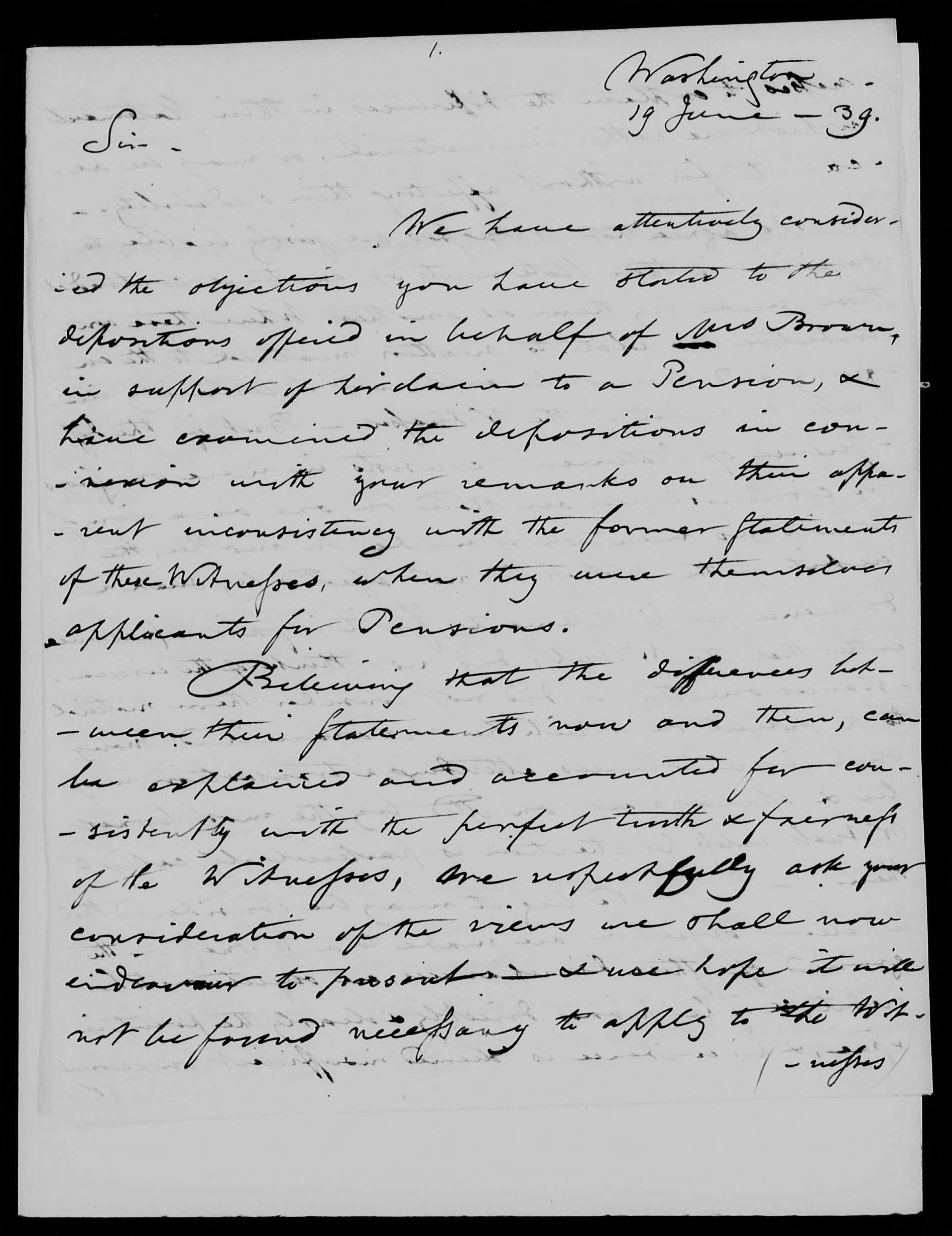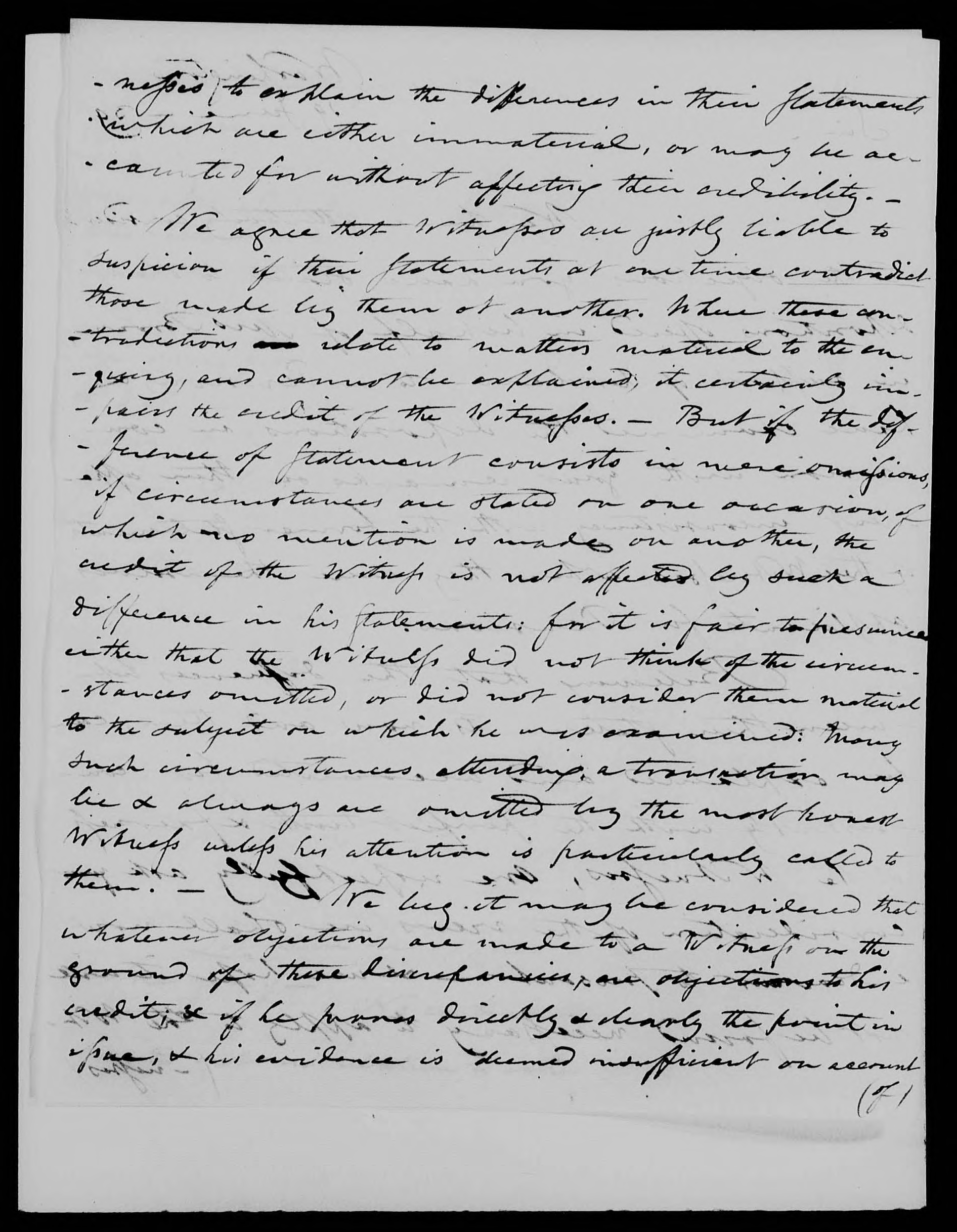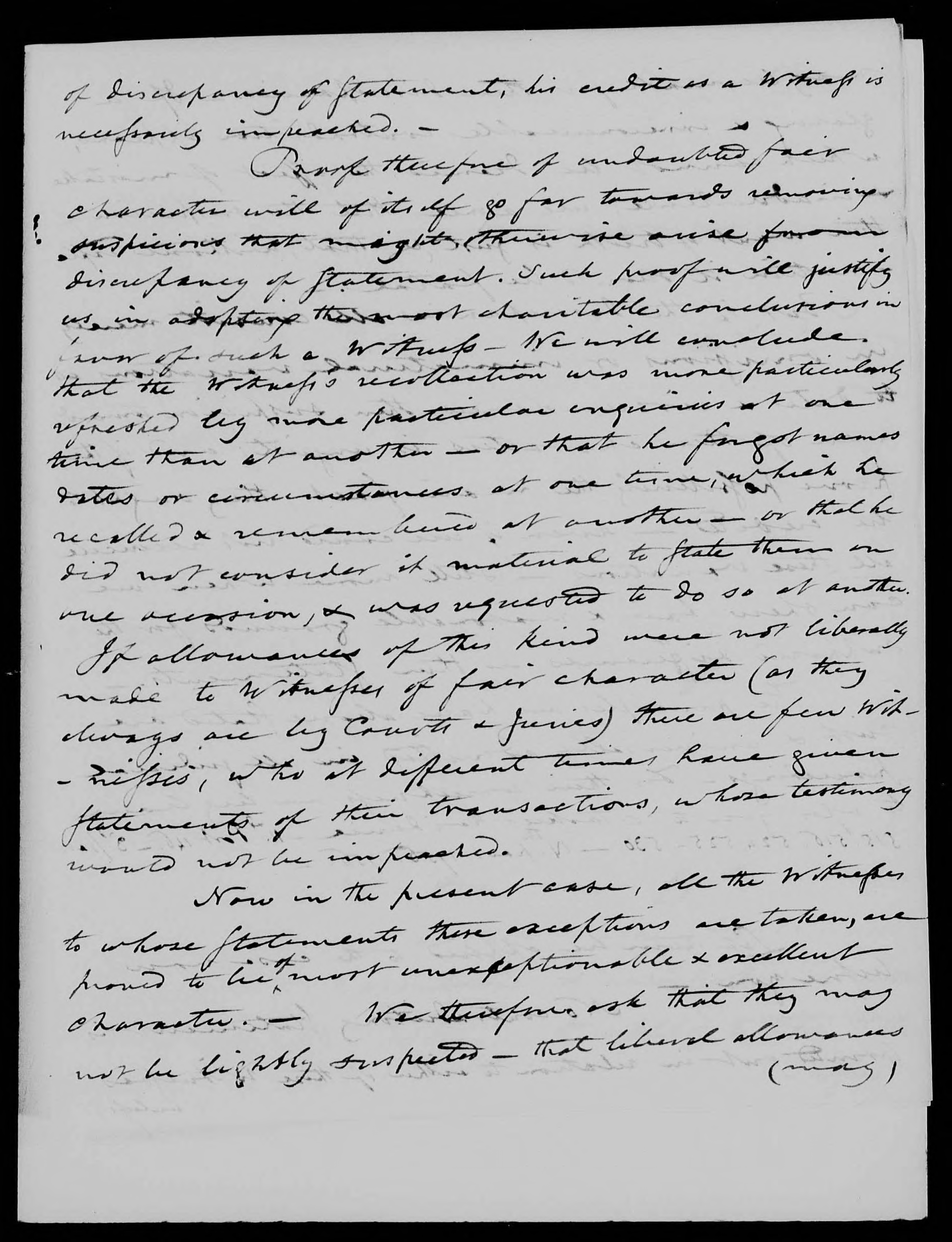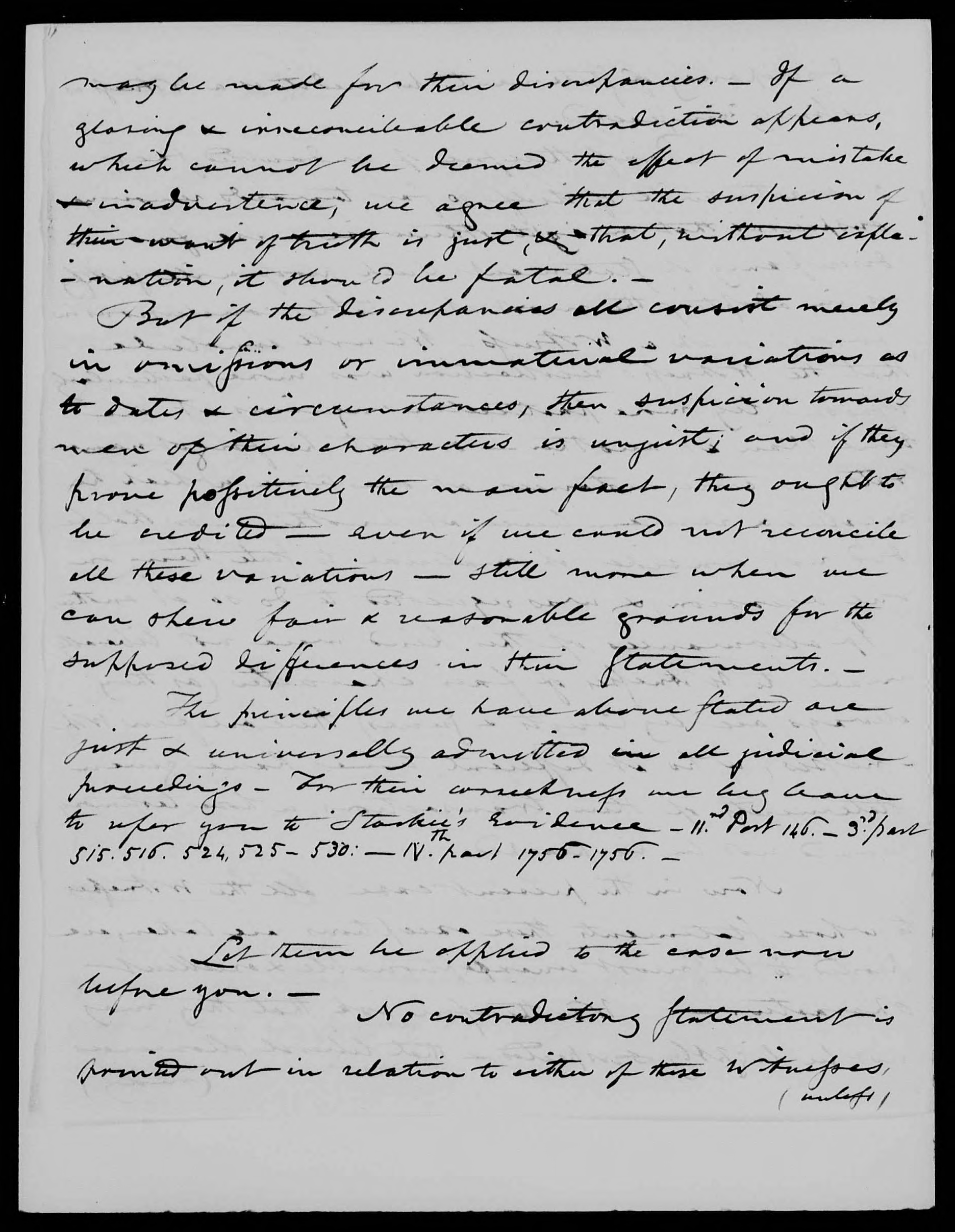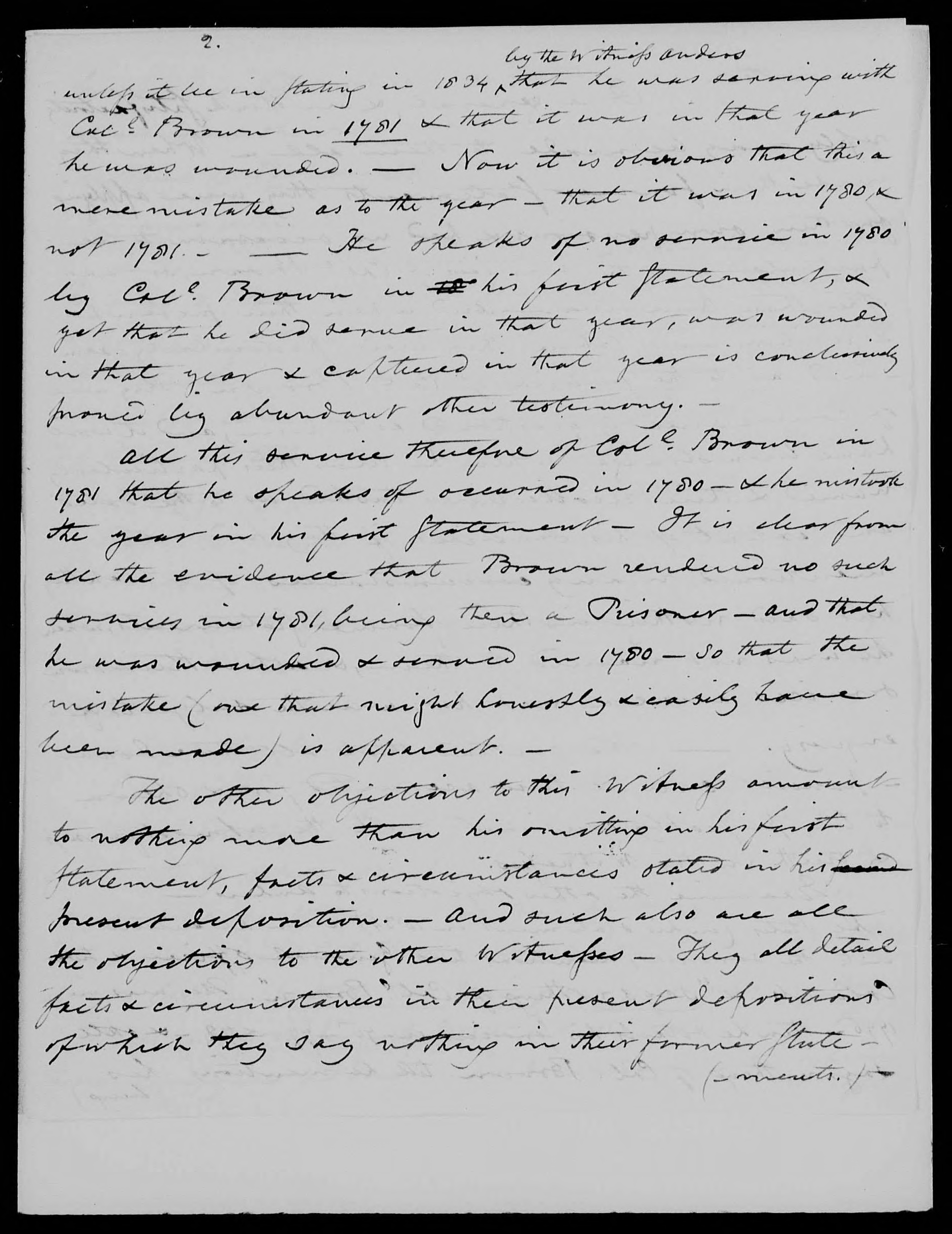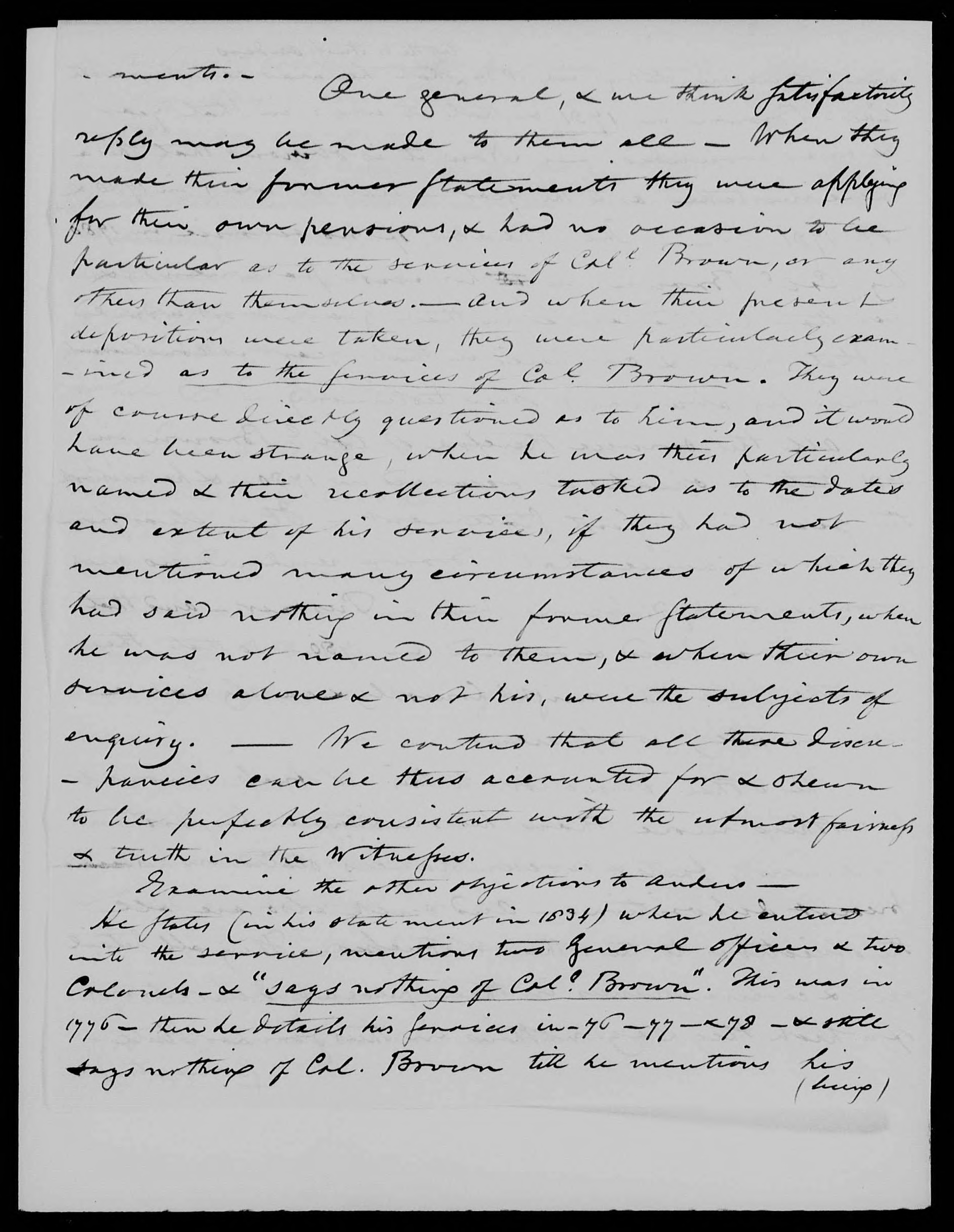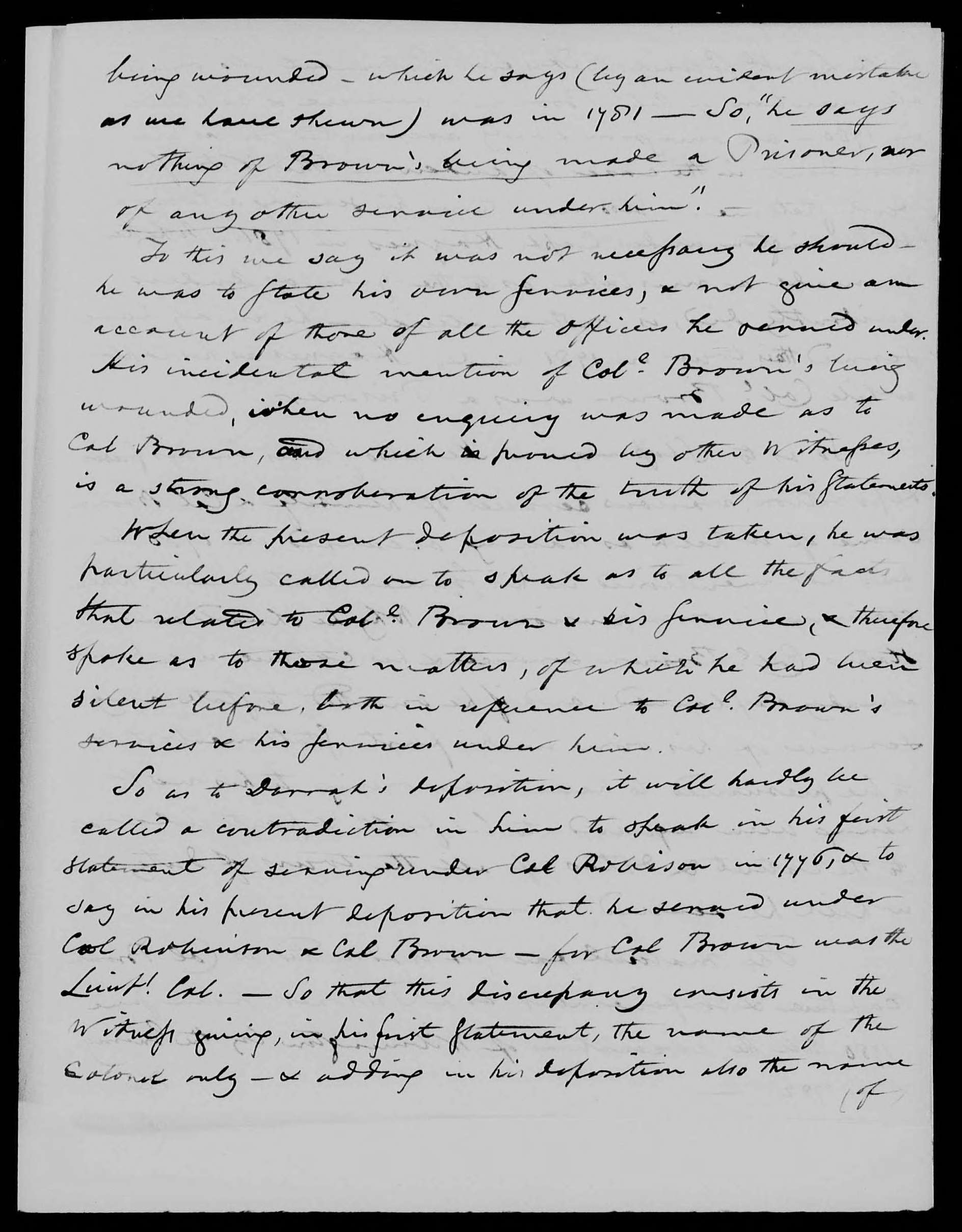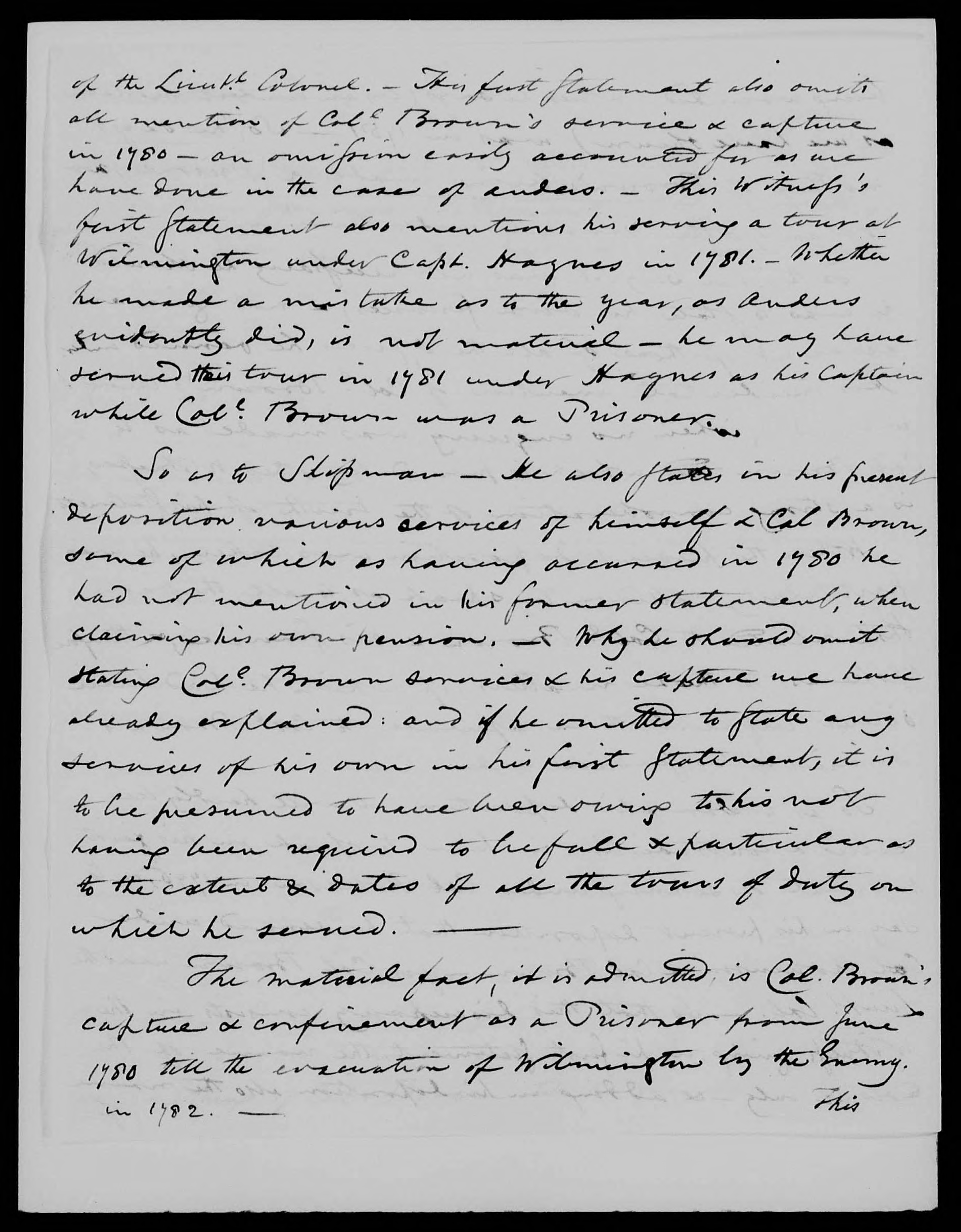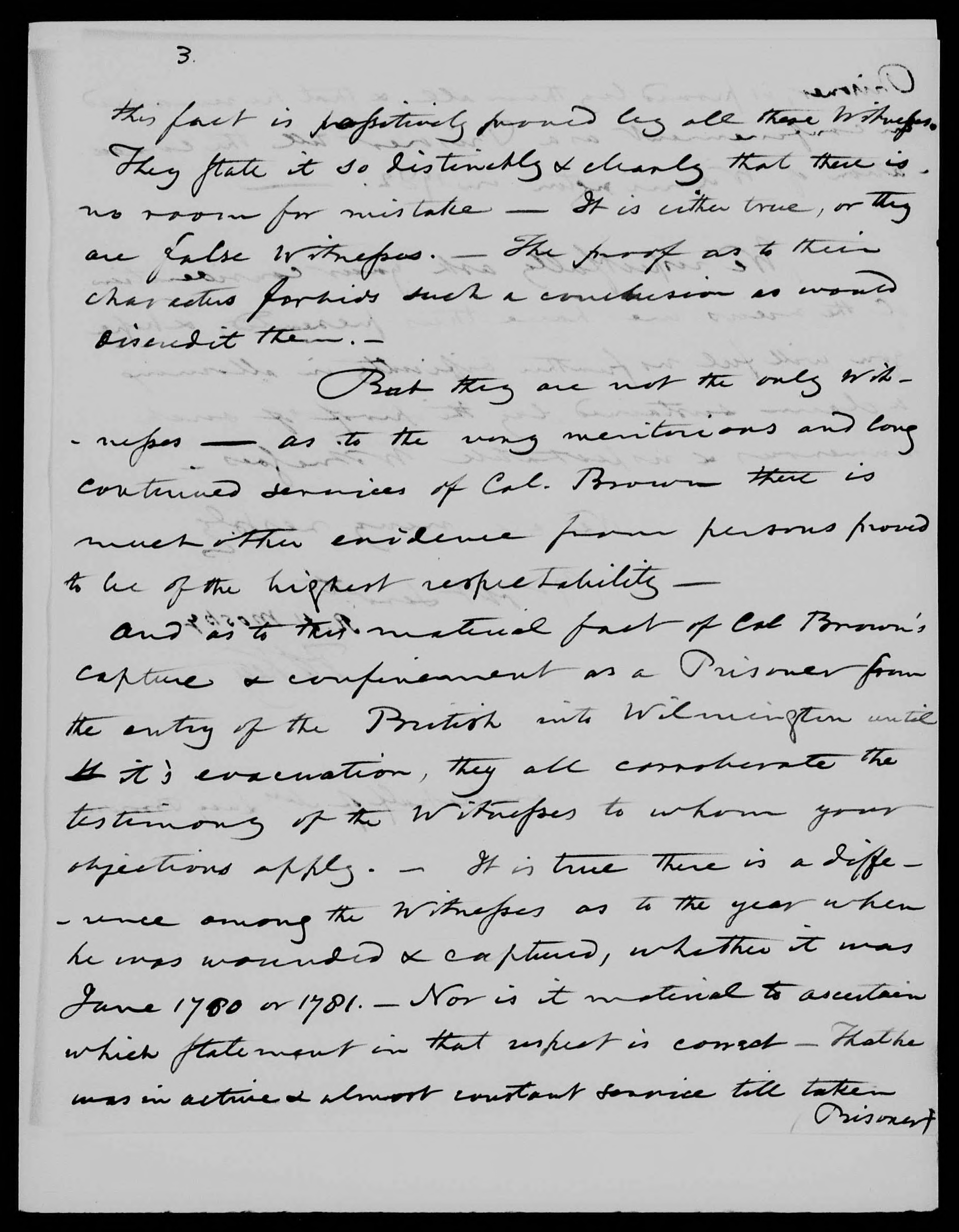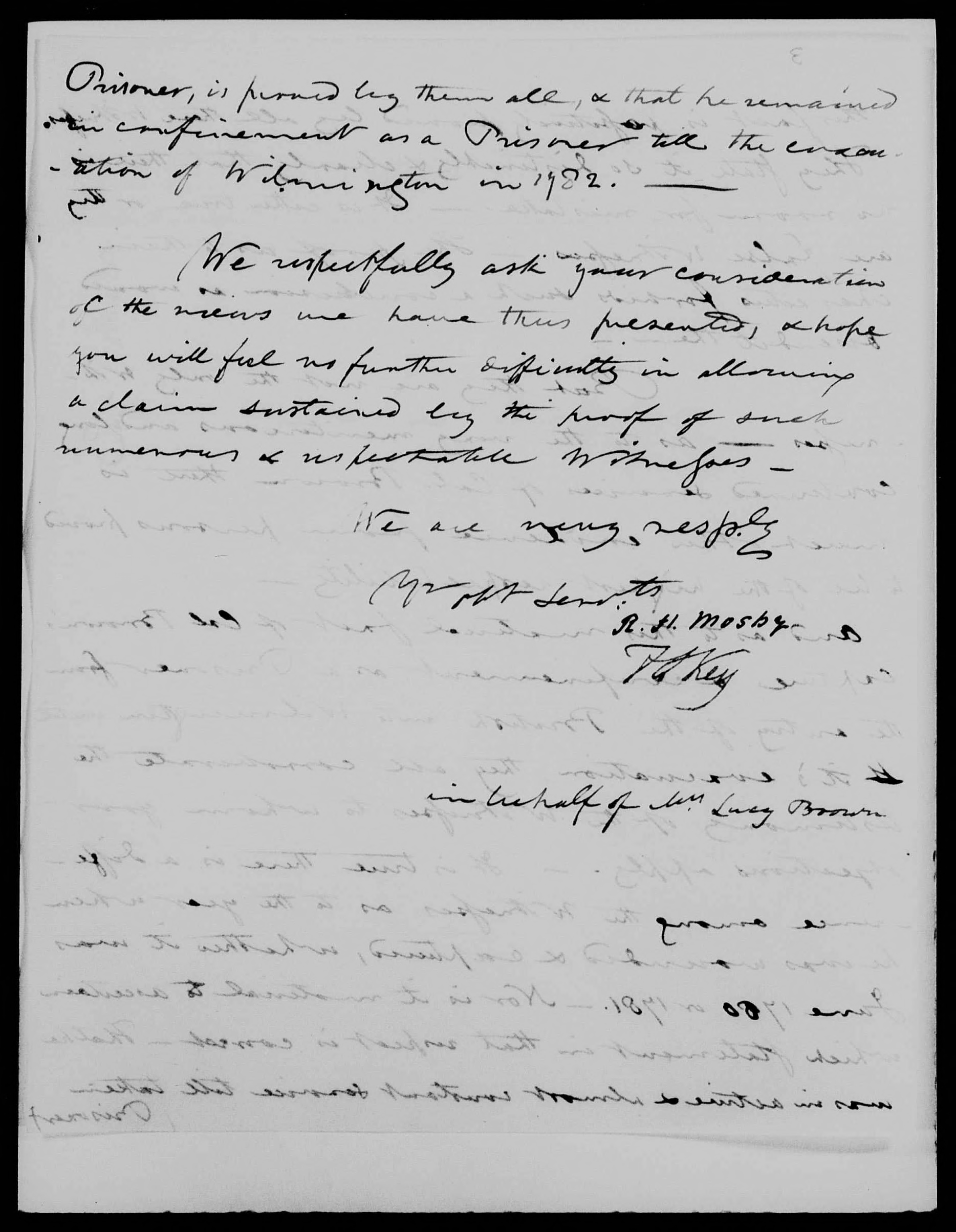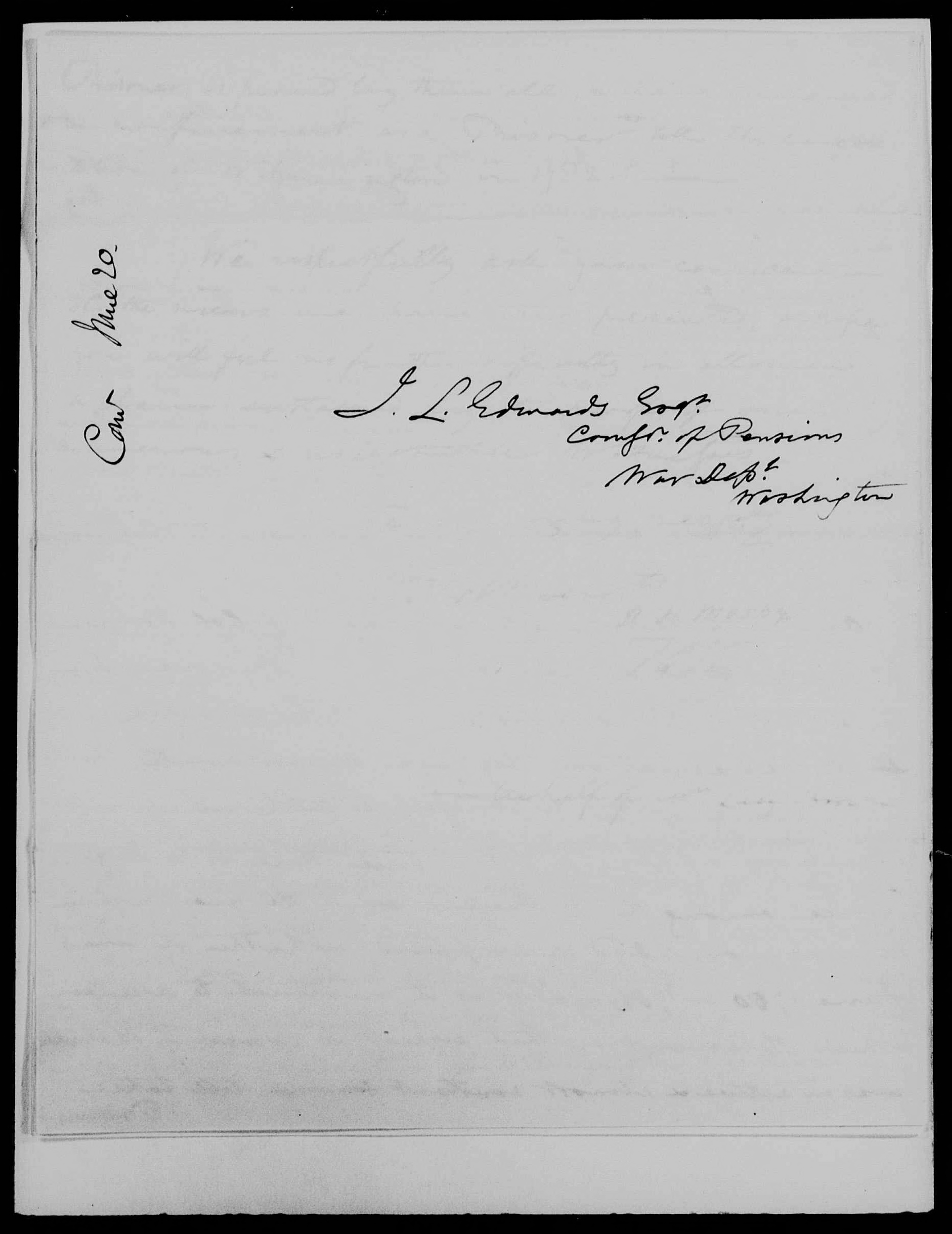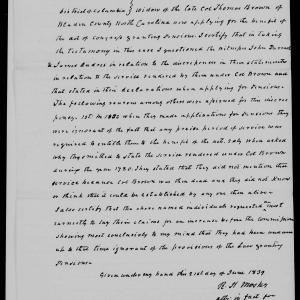Washington
19 June—39.
Sir,
We have attentively considered the objections you have stated to the depositions offered in behalf of Mrs Brown, in support of her claim to a Pension, & have examined the depositions in connexion with your remarks on their apparent inconsistency with the former statements of these Witnesses, when they were themselves applicants for Pensions.
Believing that the differences between their statements now and then, can be be explained and accounted for consistently with the perfect truth & fairness of the Witnesses, we respectfully ask your consideration of the views we shall now endeavour to present—& we hope it will not be found necessary to apply to the Witnesses to explain the differences in their statements which are either immaterial, or may be accounted for without affecting their credibility.
We agree that witnesses are justly liable to suspicion if their statements at one time contradict those made by them at another. When these contradictions are relate to matters material to the enquiry, and cannot be explained, it certainly impairs the credit of the Witnesses. But if the difference of statement consists in mere omissions, if circumstances are stated on one occasion, of which no mention is made on another, the credit of the Witness is not affected by such a difference in his statements: for it is fair to presume either that the Witness did not think of the circumstances omitted, or did not consider them material to the subject on which he was examined: Many such circumstances attending a transaction may be & always are omitted by the most honest Witness unless his attention is particularly called to them.
We beg it may be considered that whatever objections are made to a Witness on the ground of these discrepancies, are objections to his credit; & if he proves directly & clearly the point in issue, & his evidence is deemed insufficient on account of discrepancy of statement, his credit as a Witness is necessarily impeached.
Proof therefore of undoubted fair character will of itself go far towards removing suspicions that might otherwise arise from discrepancy of statement. Such proof will justify us in adopting the most charitable conclusions in favor of such a Witness—We will conclude that the Witness's recollection was more particularly refreshed by more particular enquiries at one time than at another—or that he forgot names dates or circumstances at one time, which he recalled & remembered at another—or that he did not consider it material to state them on one occasion, & was requested to do so at another.
If allowances of this kind were not liberally made to Witnesses of fair character (as they always are by Courts & Juries) there are few Witnesses, who at different times have given statements of their transactions, whose testimony would not be impeached.
Now in the present case, all the Witnesses to whose statements these exceptions are taken, are proved to be ^of^ most unexceptionable & excellent character. We therefore ask that they may not be lightly suspected—that liberal allowances may be made for their discrepancies. If a glaring & irreconcileable contradiction appears, which cannot be deemed the effect of mistake & inadvertence, we agree that the suspicion of their want of truth is just, & that, without explanation, it should be fatal.
But if the discrepancies all consist merely in omissions or immaterial variations as to dates & circumstances, then suspicion towards men of their characters is unjust; and if they prove positively the main fact, they ought to be credited—even if we could not reconcile all these variations—still more when we can shew fair & reasonable grounds for the supposed differences in their statements.
The principles we have above stated are just & universally admitted in all judicial proceedings—For their correctness we beg leave to refer you to Starkie's Evidence—IInd. Part 146.—3rd. part 515. 516. 524, 525—530:—IVth. part 1756—1756.—
Let them be applied to the case now before you.—
No contradicting statement is pointed out in relation to either of these Witnesses, unless it be in stating in 1834 ^by the Witness Anders^ that he was serving with Coll. Brown in 1781 & that it was in that year he was wounded.—Now it is obvious that this is a mere mistake as to the year—that it was in 1780, & not 1781. He speaks of no service in 1780 by Coll. Brown in 18 his first statement, & yet that he did serve in that year, was wounded in that year & captured in that year is conclusively proved by abundant other testimony.
All this service therefore of Coll. Brown in 1781 that he speaks of occurred in 1780—& he mistook the year in his first statement—It is clear from all the evidence that Brown rendered no such services in 1781, being then a Prisoner—and that he was wounded & served in 1780—so that the mistake (one that might honestly & easily have been made) is apparent.
The other objections to this Witness amount to nothing more than his omitting in his first statement, facts & circumstances stated in his second present deposition.—And such also are all the objections to the other Witnesses—They all detail facts & circumstances in their present depositions of which they say nothing in their former statements.
One general, & we think satisfactorily reply may be made to them all—When they made their former statements they were applying for their own pensions, & had no occasion to be particular as to the services of Coll. Brown, or any others than themselves.—And when their present depositions were taken, they were particularly examined as to the services of Col. Brown. They were of course directly questioned as to him, and it would have been strange, when he was thus particularly named & their recollections tasked as to the dates and extent of his services, if they had not mentioned many circumstances of which they had said nothing in their former statements, when he was not named to them, & when their own services alone & not his, were the subjects of enquiry. We contend that all these discrepancies can be thus accounted for & shewn to be perfectly consistent with the utmost fairness & truth in the Witnesses.
Examine the other objections to Anders—
He states (in his statement in 1834) when he entered into the service, mentions two General Officers & two Colonels—& "says nothing of Coll. Brown." This was in 1776—then he details his services in—76—77—& 78—& still says nothing of Col. Brown till he mentions his being wounded—which he says (by an evident mistake as we have shewn) was in 1781—So, "he says nothing of Brown's being made a Prisoner, nor of any other service under him."
To this we say it was not necessary he should—he was to state his own services, & not give an account of those of all the officers he served under. His incidental mention of Coll Brown's being wounded, when no enquiry was made as to Col Brown, and which is proved by other Witnesses, is a strong corroberation of the truth of his statements.
When the present deposition was taken, he was particularly called on to speak as to all the facts that related to Coll. Brown & his service, & therefore spoke as to those matters, of which he had been silent before, both in reference to Coll. Brown's services & his services under him.
So as to Darrah's deposition, it will hardly be called a contradiction in him to speak in his first statement of serving under Col Robison in 1776, & to say in his present deposition that he served under Col Robinson & Col Brown—for Col Brown was the Lieutt. Col. So that his discrepancy consists in the Witness giving, in his first statement, the name of the Colonel only—& adding in his deposition also the name of the Lieutt. Colonel. His first statement also omits all mention of Coll. Brown's service & capture in 1780—an omission easily accounted for as we have done in the case of anders. This Witness's first statement also mentions his serving a tour at Wilmington under Capt. Haynes in 1781.—Whether he made a mistake as to the year, as Anders evidently did, is not material—he may have served this tour in 1781 under Haynes as his Captain while Coll. Brown was a Prisoner.
So as to Shipman—He also states in his present deposition various services of himself & Col Brown, some of which as having occurred in 1780 he had not mentioned in his former statement, when claiming his own pension. Why he should omit stating Coll. Brown services & his capture we have already explained: and if he omitted to state any services of his own in his first statement, it is to be presumed to have been owing to his not having been required to be full & particular as to the extent & dates of all the tours of duty on which he served.
The material fact, it is admitted is Col. Brown's capture & confinement as a Prisoner from June 1780 till the evacuation of Wilmington by the Enemy in 1782.
This fact is propositively proved by all those Witnesses. They state it so distinctly & clearly that there is no room for mistake—It is either true, or they are false Witnesses. The proof as to their characters forbids such a conclusion as would discredit them.
But they are not the only Witnesses—as to the very meritorious and long continued services of Col. Brown there is much other evidence from persons proved to be of the highest respectability—
And as to this material fact of Col Brown's capture & confinement as a Prisoner from the entry of the British into Wilmington until th it's evacuation, they all corroberate the testimony of the Witnesses to whom your objections apply. It is true there is a difference among the Witnesses as to the year when he was wounded & captured, whether it was June 1780 or 1781. Nor is it material to ascertain which statement in that respect is correct—That he was in active & almost constant service till taken Prisoner, is proved by them all, & that he remained in confinement as a Prisoner till the evacuation of Wilmington in 1782.
We respectfully ask your consideration of the views we have thus presented, & hope you will feel no further difficulty in allowing a claim sustained by the proof of such numerous & respectable Witnesses—
We are very resply.
Yr obt Servts:
Comr June 20.
Date:
Related People:
Repository:
Places:
»» »» Washington, D.C.

